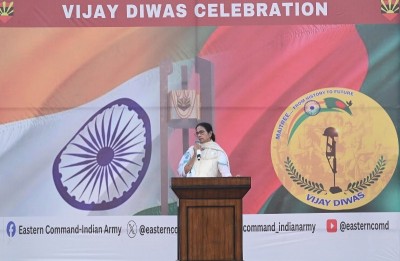 Floriculture
Floriculture
Beyond Article 370: India revives Floriculture centre in Kashmir summer capital Srinagar
Srinagar: India has taken substantial steps to revive the floriculture centre situated in Srinagar which was destroyed by floods, a step which can be perceived as a positive move in the region recently celebrated the first anniversary of the scrapping of Article 370 in the region.
“Nursery is the backbone for the landscaping work because all the initial plant material is prepared here. Because of the floods, several kinds of bulbs, ornamental bushes, etc. were destroyed. After the floods, the government took substantial steps to build this nursery again. We are also improving the quality of the soil by doing the manoeuvring process,” Imran Ahmad, Assistant Floriculture Officer Gardens and Parks, told ANI.
“Before 2014 floods, people used to visit the centre to buy flowers and saplings. The earth filling is now being done. The carnations would be planted too,” Farooq Ahmad, Employee, told the news agency.
“Roses and other kinds of exotic plants were there in the nursery earlier. Work is underway to revive the same. It will take some time,” Mushtaq Ahmad, a gardener, told ANI.
The Department of Floriculture was created by the Jammu and Kashmir Government in 1969 under direct control of famous botanist Prof. K. N. Kaul, who was also the uncle of late Prime Minister Indira Gandhi.
Since then much has been done in renovating the old gardens and developing new sites and complexes. The department is contributing significantly by adding new varieties of flowers and beautification plants in existing gardens and parks.
At present the department maintains more than 275 gardens and parks in Kashmir covering approximately an area of 500 hectares. The number is ever increasing.
The Department of Floriculture is providing technical know-how support for plantation and proper maintenance of plants and also by way of setting up Nurseries therein growing greenhouse seedlings, and helps in commercializing this activity.
The department also provides subsidy on purchase of material for growing of high value crops like carnations, roses, liliums, hydrangias and Tulips, etc. (50% of its cost) for the maximum purchase for an area of about 4000 sq.mts under controlled conditions by individual private grower.
Department also guides and assists the entrepreneurs in marketing of the cut flowers.
Image caption: A tulip garden in Srinagar / Unsplash
Support Our Journalism
We cannot do without you.. your contribution supports unbiased journalism
IBNS is not driven by any ism- not wokeism, not racism, not skewed secularism, not hyper right-wing or left liberal ideals, nor by any hardline religious beliefs or hyper nationalism. We want to serve you good old objective news, as they are. We do not judge or preach. We let people decide for themselves. We only try to present factual and well-sourced news.







